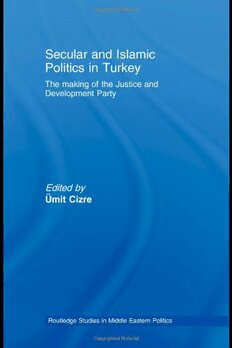
Secular and Islamic Politics in Turkey: The Making of the Justice and Development Party PDF
245 Pages·2007·1.792 MB·English
Most books are stored in the elastic cloud where traffic is expensive. For this reason, we have a limit on daily download.
Preview Secular and Islamic Politics in Turkey: The Making of the Justice and Development Party
Description:
Turkey is ninty-nine per cent Muslim, its ruling party, Justice and Development Party (JDP), comes from but denies its Islamist pedigree and has a very secular feel. However, the deeply secular regime distrusts the JDP with regard to its 'true' colours. This book makes sense of these paradoxical perceptions which have characterized Turkey’s politics since the JDP has come to power in 2002. The key momentum for shaping the nature and trajectories of the ruling party of Turkey since 2002, the JDP, has been the ‘identity’ question. The JDP’s commitment to transform Turkey’s politics was part of its engagement to remake its own identity. The JDP’s adoption of a conservative-democrat identity has rested on a new understanding of Westernization, secularism, democracy and the role and relevance of Islam in politics. The book’s central problematic is to explain both the politics of change the JDP initiated and sustained in the first three years in office and the politics of retreat it has made from its reformist discourse since 2005. The book analyzes not just the catalysts for its reformist discourse of the first 3 years but tries to explain its reversal to an inward-looking conservative nationalist course. By approaching this topical debate from the conceptual stance rather than a party-centered approach, ?mit Cizre identifies that the change the JDP has initiated within Turkey’s political Islam and in Turkish politics is the product of an interactive process between many levels, actors, forces and historical periods. The forces and actors covered include: global forces of Islam the secular establishment and its popular extensions the past and present Islamic actors in political and non-political spheres the changing balance of forces in the region which frame the EU and the US policies toward the JDP. Secular and Islamic Politics in Turkey is a valuable contribution to the study of globalization and ‘change’ in contemporary political Islam, the relationship between religion and politics, and secularism and political Islam. As such, it will be of interest to students and researchers alike in the area of Islamic politics, democratization, European Union and political Islam, and globalization.
See more
The list of books you might like
Most books are stored in the elastic cloud where traffic is expensive. For this reason, we have a limit on daily download.
